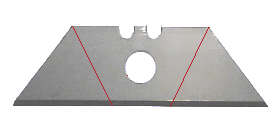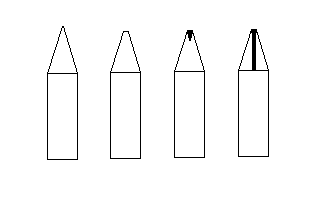DIY Broadheads for 50# and 80# bows
From left to right:
Original
Blunt end with file (you will lose it later anyway)
Using a triangular file, cut a stater notch.
Cut slot using a hacksaw or Dremel type tool with an abrasive cutoff wheel (prefered)

Use the Dremel cutoff wheel to score just inside the red lines.
Grasp the pointed end with pliers, and snap off against a hard suface. WATCH YOUR EYES!
Try the triangles you just made in the slots in the bolt points. It should be a little loose.
This jig is the key to making good broadheads. The shaft should just touch the bottom of the slots when the "feathers" just rest on the top surface.
Use your finger to work a dab of J-B Weld Kwik under the slot and between the slot and blade. Don't try to make it perfect, only hold it in place.
When dry, work more J-B Weld under the slot. Use your finger to make a smooth edge. Clean up with a paper towel dampened with acetone.
Finished bolt.
Clean up the back of the blade with your grinder, to resemble the above photo.
IMPORTANT! Make sure the broadhead is not too wide to clear any framework before you use it.
EXTREME:
TOP 4 bladed razor broadhead fitted to the aluminum shaft with a solid plastic bolt on the other end (the field point was removed)
MIDDLE 4 bladed razor head with 1/4" fiberglass shaft. Both of the above will fit the standard 50# pistol.
BOTTOM 2 bladed broadhead fitted by turning the field point to the standard 5º taper.
Magnus 125 grain, 2 1/2 x 1 1/4 inches 11/32 ferrule
This design is probably the easiest to modify for the crossbow pistol. Avoid the type that have a triangular slot in the blades. It does not HAVE to be this model or manufacturer.
Grinding
OBVIOUSLY, THEY ARE RAZOR SHARP, SO DO THIS WITH EXTREME CARE!
A slip when grinding could cause serious injury.
The rear of the head must be removed until the ferule is 1/4" in diameter. Since the one shown is 1 1/4" wide, that means 1/4" must be removed from the side of each blade to bring it to the width of the tail feathers if you wish to use them in the magazine. It is easiest to clamp it securely in a vise, then use the abrasive cut off wheel in the Dremel tool to remove material from the back of each blade. If the blades were very wide to begin with, some may have to be ground from the sides.
LINKS
Broadhead flight
Single bevel broadheads PDF
